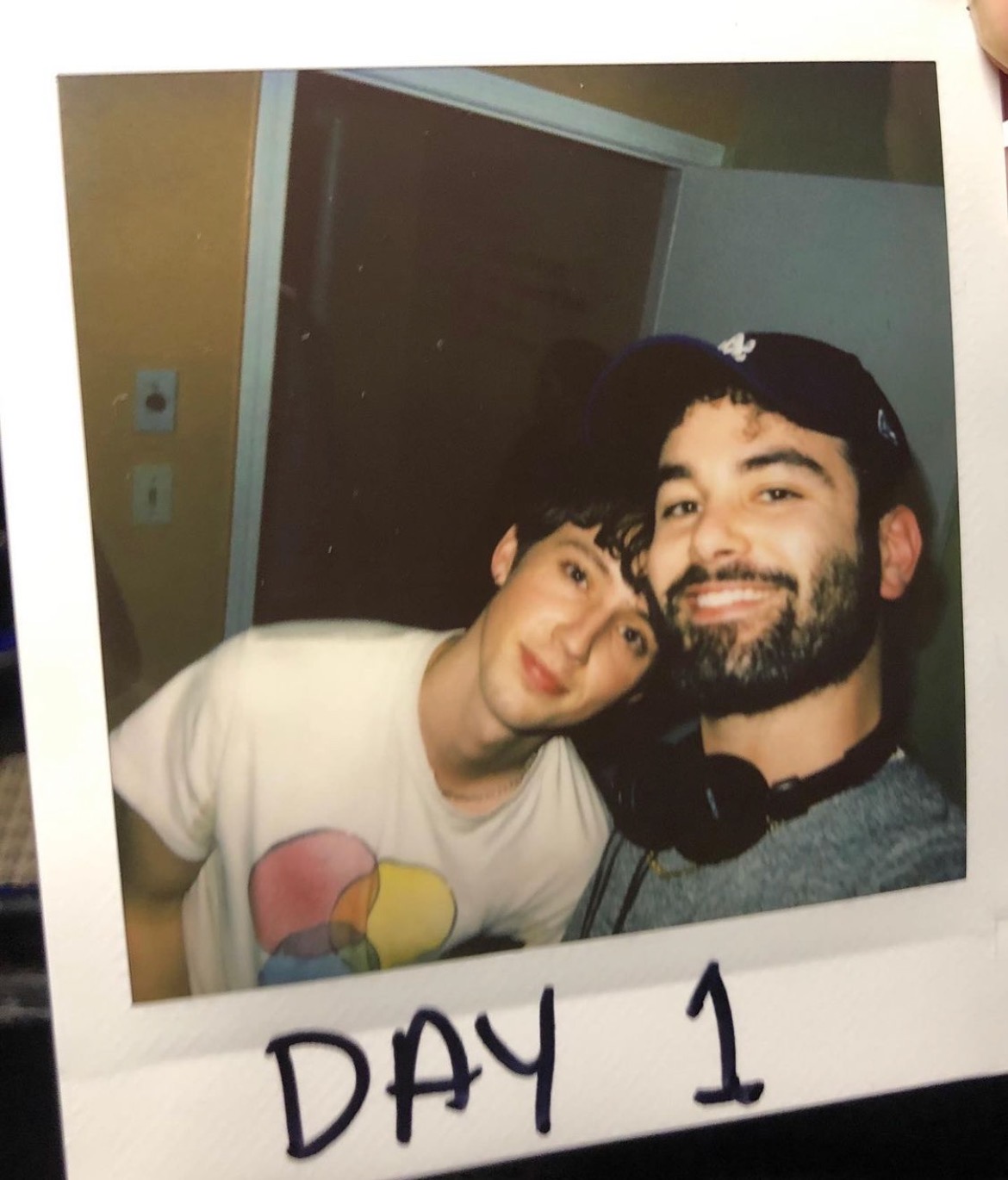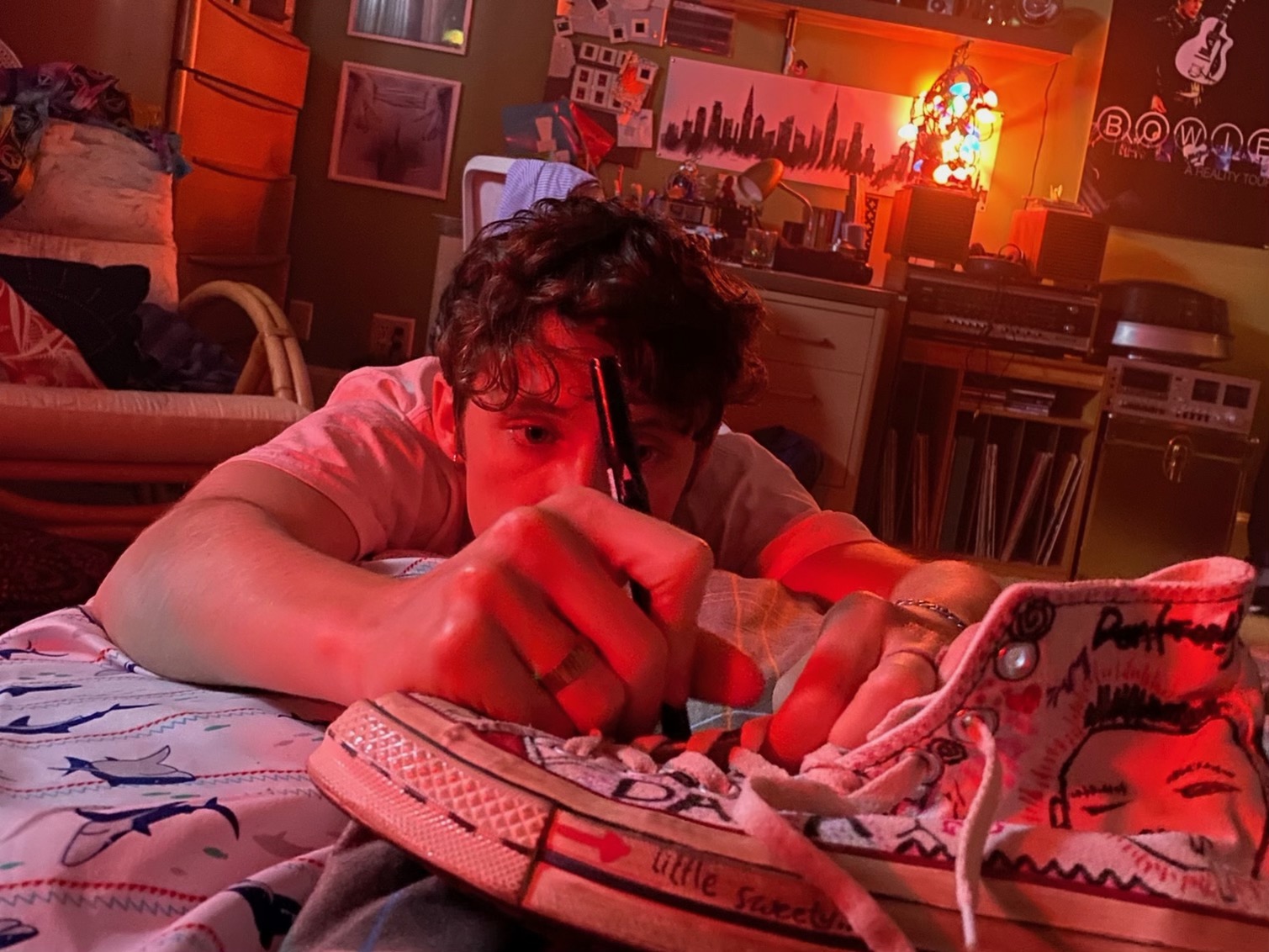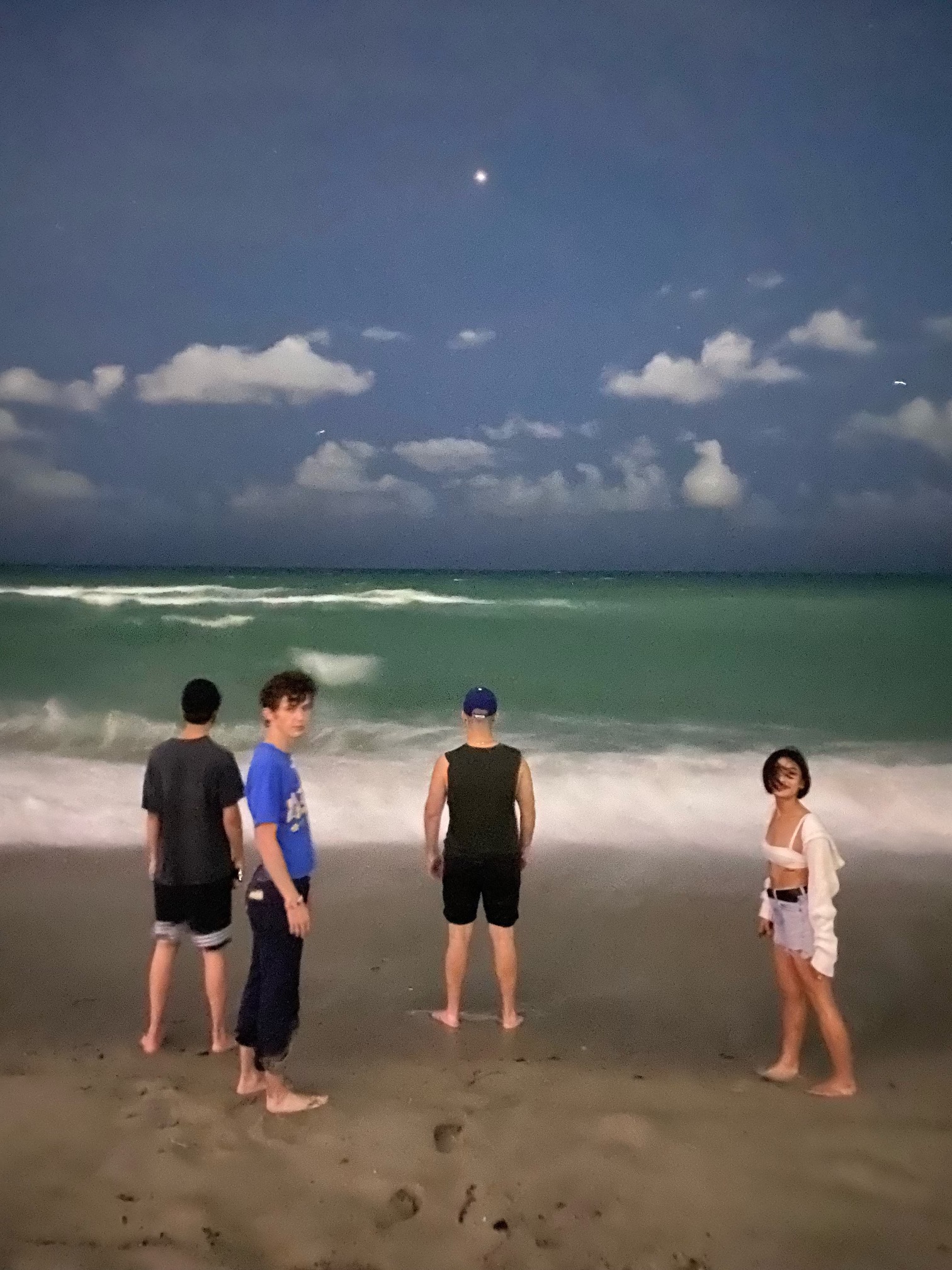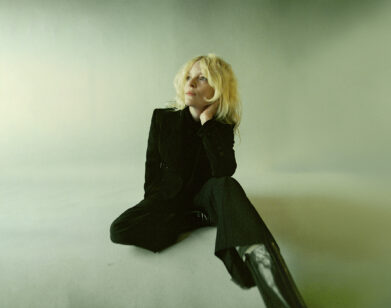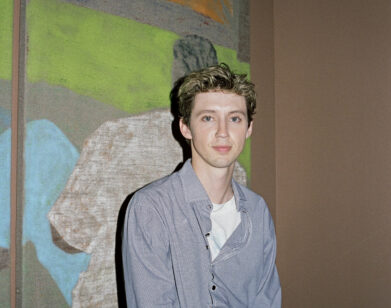in conversation
Troye Sivan and Jared Frieder Have A (Very Gay) Conversation
Unlike most queer coming-of-age films, Three Months, written and directed by Jared Frieder and starring Troye Sivan, is not about the struggles of being queer. Instead, it’s about the private moments of strength and joy in the process of coming into one’s own. If Juno‘s wit and charm emerged out of the harsh reality of teen pregnancy, Three Months’ clever tenderness reflects the solitary journey of self-discovery for queer teenagers growing up outside of LGBTQIA+ hubs. The film centers on Caleb [Sivan], an openly gay Jewish teen living with his grandmother [played by Academy Award Winner Ellen Burstyn], over the three pivotal months after he is exposed to HIV. This three-month sentencing period—it takes that long to accumulate enough antibodies to test positive for the virus—is what gives the film its name.
While the semi-autobiographical film does touch on the usual subject matter—strained relationships, rejection, traumas—these are not its focal points. Instead, Frieder relies on tenderness and humor to paint a portrait of a queer teenager who is learning to fall in love, trust friendships, and find joy in family, even when faced with potentially life-altering news. Three Months marks Sivan’s first performance in a leading role, and Frieder’s directorial debut. The filmmaking process—which has been in motion since 2015, when Frieder’s script appeared on the famous Hollywood Black List—turned out to be nothing short of life-changing. To mark the film’s release, Frieder and Sivan got together for a (very gay) conversation about the power of Robyn’s music, mastering one’s inner saboteur, and scaring Academy Award winner Ellen Burstyn on set.
———
TROYE SIVAN: How are you?
JARED FRIEDER: I’m good. I woke up at six a.m. to train. It’s how I get rid of my anxiety. What about you? Saturday night was crazy, by the way.
SIVAN: I know. I feel like I know the answer to this, but when was the last time you danced?
FRIEDER: The last time I danced was with you on Saturday at Otter Pop in Silver Lake, in a room that was so crowded I was checking for the exits in case there was a fire.
SIVAN: You know that I don’t do drugs, right?
FRIEDER: Yes.
SIVAN: I would not be surprised if someone told me that they were sprinkling Molly in my drinks that night because I felt euphoric. I could not stop smiling the whole night. I was having the best night of my life.
FRIEDER: All my friends were like texting me like, “When are you getting here. Troye’s here. He’s having a great time.”
SIVAN: It was another level. I don’t know what happened, but I was fucking losing my mind. I have this very vivid memory of a good remix of Hallucinate by Dua Lipa coming on, and it was like a mosh pit. It was like a gay mosh pit.
FRIEDER: It was unbelievable. I think you had left, but they played—I don’t know if you even know her, you’re too young—do you know who Samantha Mumba is?
SIVAN: No.
FRIEDER: Okay, she was this pop star from the early 2000s who has a song “Baby Come On Over Tonight.” Literally, every gay person above the age of 30 just screamed at the same time.
SIVAN: You know, that’s always a cool moment for me. I remember I had the same moment when I went to see Robyn. Well, not to brag, but I supported Robyn. Were you at that show?
FRIEDER: That was my birthday and we had not met for the movie yet. We were so excited to go to Robyn and then someone was like, “Troye’s opening.” You were so amazing. That was the Forum, right?
SIVAN: Yeah. I remember looking around and seeing the crowd sing along to these songs. Sometimes, as a gay person, music feels so personal. I don’t know about you, but I felt like I discovered Robyn on my own. I didn’t have any friends that were listening to Robyn or told me to listen to Robyn. I found her and I was obsessed, and I didn’t know why I was so obsessed. And then when you get older and you finally find your way to these queer spaces, you see that other people have had the same moment when they were in their room listening on their laptop with no one to talk to about it. You get to converge and have this gay conference where you’re like, “In this house, we listen to Little Mix or Robyn,” and everyone’s going to sing every single word. It’s a spiritual experience, I think.
FRIEDER: Oh, absolutely. I feel like my musical interests are truly just Little Mix and Robyn. That is the bullet train of my heart. That concert was so fun, I have never seen people lose their minds quite like that—especially gay people—at a concert before. Gays at Robyn remind me of 11 year old girls at a Taylor Swift concert. 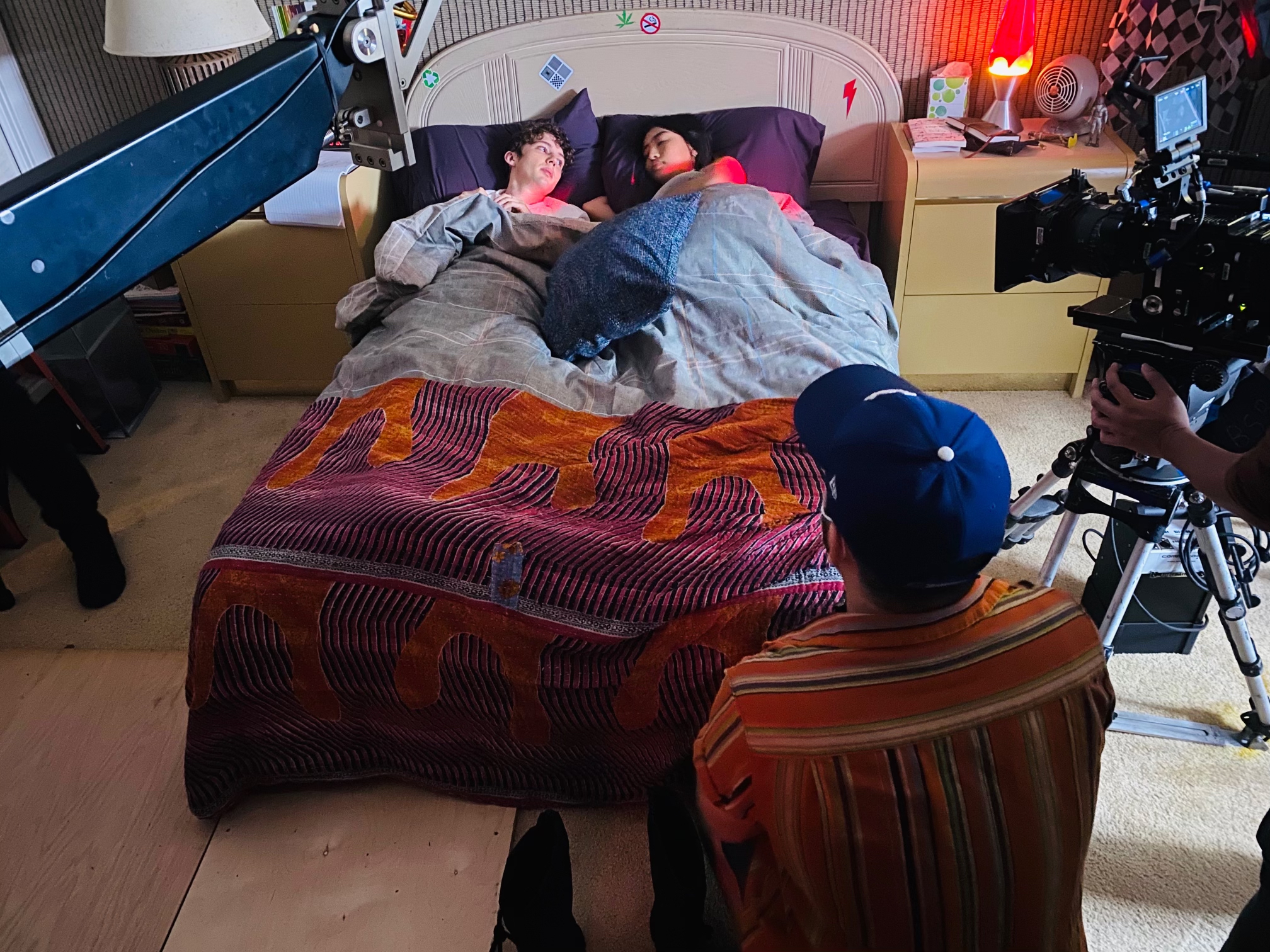
SIVAN: Robyn has her own festival in Sweden. I was there writing, and I went to the Robyn festival. I’d seen her in L.A. and San Francisco where the crowd was full of gays, but in Sweden, the crowd was full of old people and kids, all singing every single word. Straight people! She is the queen of Sweden.
FRIEDER: Let’s talk about Three Months. What was your favorite scene to shoot?
SIVAN: It’s funny because at the time we filmed it, I wanted to cry, but—sorry, spoiler—the breakup scene. I showed up after reading and preparing for that scene, for this very heavy, dramatic moment. But you were so insistent on making it funny. I did a take, and you were like, “No.” That was when I wanted to cry a bit. That was the first time in my life where I felt like an actor. Trying things, changing things, and doing take after take until the scene really came alive. It felt like this living, changing thing where every take was different. It pushed me and ultimately ended up being one of my favorite scenes in the movie to watch. I ended up really loving the challenge.
FRIEDER: It was so fun. I remember running to you and being like, “Let’s go more manic with it. Let’s just get crazy.” You slayed. That’s probably in the top five scenes for me in the film.
SIVAN: Throughout filming, you infamously said that every scene was your favorite scene in the movie. I’ve always wondered: gun to your head, if you had to pick, what is your actual favorite scene in the movie?
FRIEDER: Gun to my head…
SIVAN: Gun to Jane’s head.
FRIEDER: Oh, no. Not a gun to my dog’s head. The pressure is on. I would have to say the Ellen Burstyn speech scene, when she’s in bed with you. I would have to say that’s my favorite scene in the film.
SIVAN: Another traumatic memory for me, yes.
FRIEDER: But you’re so good in that scene, too!
SIVAN: Remember when I gave Ellen a fright by accident?
FRIEDER: Oh my god [Screams]. I’ll never forget that sound. We did it different ways—one where you were sad, one where you were angry. You were so angry and you were so in it and it was so good.
SIVAN: You hadn’t told Ellen that I was going to be angry, so she was expecting sad, quiet Caleb. Suddenly I yelled at her.
FRIEDER: She went [Screams]. I was like, “Oh no, I hope I just didn’t kill Ellen Burstyn.” That’s my favorite scene because it felt like watching me and my grandma. I had just lost her a few months before, during the COVID shutdowns, and that was still pretty raw for me. So, it felt the most personal to me in a way. Even the rehearsals with you and Ellen on the bed—you could hear a pin drop. It felt like there was something magical happening. I do also have to say the scene with you and Brianne [Tju] on the floor of the Mini Mart.
SIVAN: I love that scene.
FRIEDER: That is tied for my favorite scene, because to me, that’s what the movie’s about. “I’m going through this challenge. Will it make it harder for me to find love?” And your best friend says, “Yeah, but I’ll be there for you.” And you, through subtext, being like, “Well, that’s just not enough.” That resonates. That’s what it means to be a young queer person trying to find your own value through friendship and relationships.
FRIEDER: Even when there’s a gun to your dog’s head, you still can’t pick a favorite scene.
FRIEDER: Were you nervous to play Caleb at first? And if so, what made you the most nervous?
SIVAN: I was so nervous. First of all, not auditioning makes me feel like a fraud. I have imposter syndrome at the best of times. I remember before we started filming, I sat on the floor upstairs, and I read a scene. I had already gotten the part. I did, basically, a self-tape of the condoms monologue.
FRIEDER: You sent me the video.
SIVAN: I think that was probably the most nervous I was throughout the entire process because it was my first time showing how I imagined Caleb to be. I was terrified. There’s so much personality on the page with Caleb, and bringing that to life was stressful. He was so good on the page that I wanted to make sure that he was like that in real life—charismatic and endearing. He’s a little shit, but I fell in love with him. I wanted to make sure that everyone else did as well.
FRIEDER: I remember exactly where I was when I got that video. In Atlanta, in my little Anthropologie decorated Moroccan version of Jungalow Bungalow. I watched it and I almost started crying. I ran to Dan [Dubiecki] and Laura [Alameddine], our producers, and I was like, “Look at what Troye is doing.” Not only are you just an innately gifted actor, but you are the hardest worker. I was just talking to Jeremy O. Harris at a party this weekend before I ran into you, and he was like, “How was it working with Troye?” He was so excited, I was so excited.
SIVAN: Thank you, by the way. This is obviously your first time writing and directing a feature. How did you know that this was the story to start with? And now that you have survived it, do you want to do it again?
FRIEDER: I feel like I had no choice in the matter. It felt sort of cosmic. This was the story that just wouldn’t die. Have you seen Austin Powers?
SIVAN: Yes.
FRIEDER: Okay, you know, when he’s trying to kill that woman and she won’t die and he’s just like, “Why won’t you die!” That is this movie. Every time I tried to put it away, it came back.
SIVAN: You are a really prolific writer. Like, you write a lot.
FRIEDER: All the time, constantly. It’s like you, I imagine, with writing music. It’s a form of therapy, it’s a form of self-expression, and it’s also a form of escape. I love to create a world that is reflective of my own, but also not my own, so I have somewhere to disappear to when things are hard. Right now we’re still in a pandemic and there’s a potential World War III going on, so I find that I’ve been writing more than usual, because it’s a place to disappear to. I definitely want to direct again. I’m a pretty conflict-averse person. I love for people to like me and be jovial and friendly, and I managed to direct this whole movie without upsetting anyone.
SIVAN: You don’t like to upset people. I have held on to the fact that—was I rude to you the first time we met?
FRIEDER: Yes.
SIVAN: That is so shocking to me because, not to toot my own horn, but “rude” is not a word that I hope anyone would ever use to describe me. I want to know what happened. 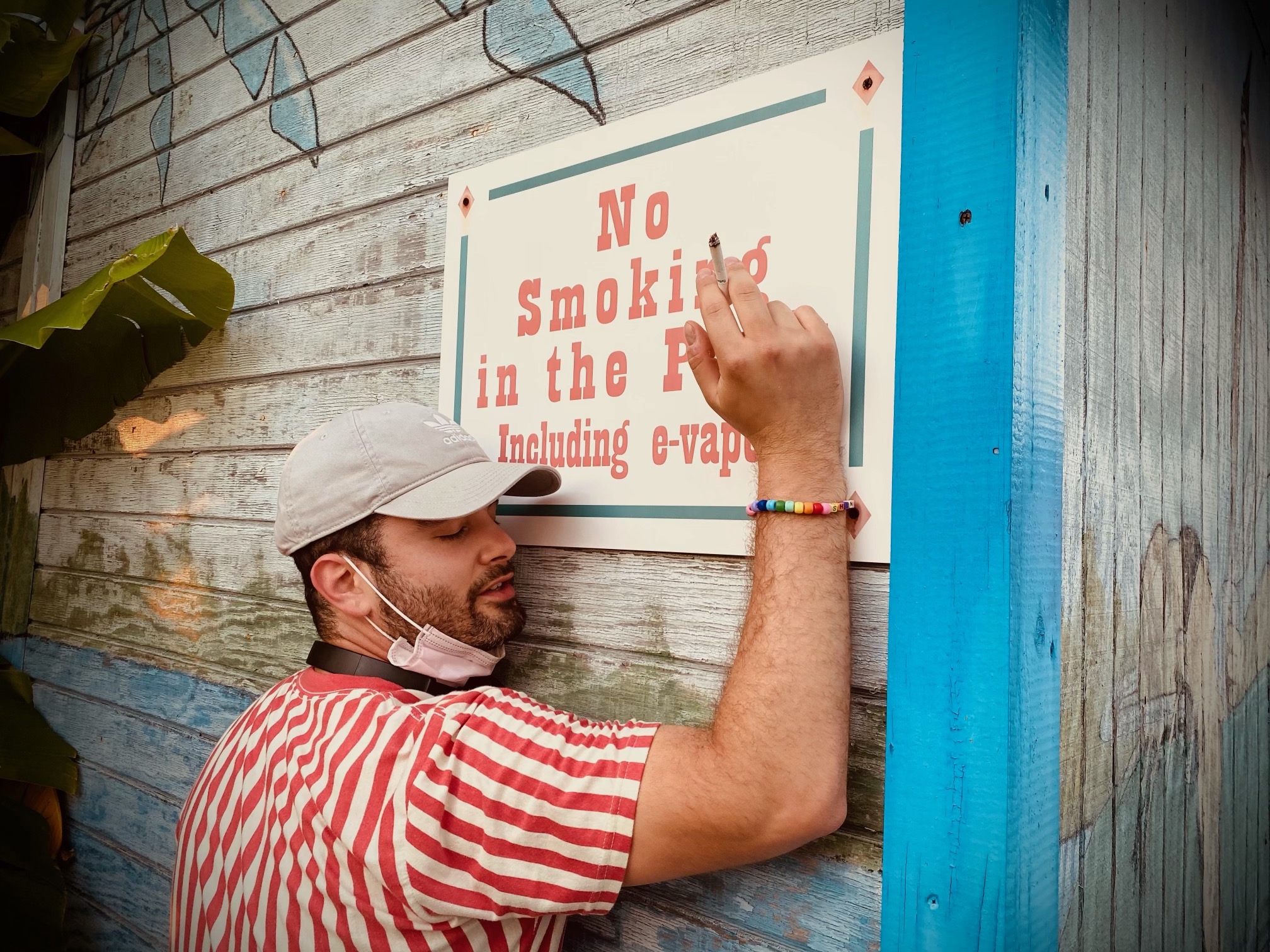
FRIEDER: It is crazy—and I have to say this because this be in printed, and say this all the time—how nice you are. You’re one of those people who does not need to be nice, which is a terrible thing to say. But like, you don’t have to be nice. Shout out to your parents for giving you have the heart of gold that you have.
SIVAN: Let’s talk about it. What happened?
FRIEDER: I don’t remember the first exact time that we met, but one of the really influential times that we met, our interaction went downhill.
SIVAN: I didn’t know that this was a fight. I didn’t know that this happened.
FRIEDER: It wasn’t a fight. First of all, it was over Little Mix. We were at a birthday party. I think Hari Nef’s birthday. Little Mix’s “Shout Out to My Ex” era was in peak queer consciousness. We were dancing and “Touch” came on, and I was like, “Oh my god, this is my favorite song.” You were telling someone how good Jacob [Bixenman, Sivan’s then-boyfriend] was at that song, and I was drunk and I could not find a note with a magnifying glass. I remember just shouting the chorus, and you were like, “Hey, shhh. Let Jacob sing it.”
SIVAN: I must have been drunk. But I do remember having a great sense of pride that my boyfriend knew every single word to that song. He does this thing where he manages to stay in the original key of these big female pop stars, and he kills it. So I must have been wasted like, “Shut up, this is not your moment.”
FRIEDER: But it was still a great moment, it was still a great night because, because I was like, “One of my favorite pop stars also loves this Little Mix song.” What is your favorite Taylor Swift song, and why is it “This Is Me Trying” off of Folklore?
SIVAN: That’s a great question, and I need a second because I don’t know that it is “This Is Me Trying.” That’s obviously top three for me. She has an instinct in her that she taps into, maybe, once per album that syncs up exactly with this instinct that I have. It just scratches a part of my brain that I can’t explain. I just love it so much. I’m always like, “I wish I wrote that song.” Let me think about this. I would say, it’s either “You Are In Love”—
FRIEDER: —Oh a stan! A stan deep cut.
SIVAN: I feel like she does it again on 1989 in “Clean.” “This Is Me Trying,” feels evergreen, heartfelt, and effortless. When she hits that stride, I get so jealous, and I just want to listen to the song over and over and over again. I’m always like, “Damn, Taylor Swift is so good.”
FRIEDER: Okay, what was the most surprising thing about meeting and working with Academy Award winner Ellen Burstyn?
SIVAN: You never are sure what you’re going to get when you meet someone at that level. Not that I expected anything different, but I was pleasantly surprised at how unbelievably warm she is. She really wanted to help me, and she really cared about me as a person and an actor. I wasn’t necessarily expecting that. People can come in, do their thing, and blow you out of the water, and leave you in the dust. This is my first lead role, and she really became a rock for me through the process. I felt I could ask her anything. I think about her almost every day because I am doing a bit of acting again now. I’ve had no training as an actor, and I’ve got this chip on my shoulder becauseI always wanted to go to acting school. There was a really good one in Perth, but I was already working and they don’t let you work while you study. I didn’t want to derail any progress that I was making, so I didn’t go. Having these big picture conversations with her about acting and what it means to train was so helpful to me. It felt like she genuinely was my grandmother.
FRIEDER: You can feel that when you watch it. You feel that there is this maternal instinct that she has for you.
SIVAN: I mean, I could ask you what is next for you, which I think is the obvious question, but there’s a question here that’s much more interesting.
FRIEDER: Do the interesting one.
SIVAN: I have no idea how you’re going to answer this, because I don’t know how I would answer it. What do you think about love?
FRIEDER: It is the balloon I cannot stop chasing in the middle of a hurricane, is what I think about love—to be a little poetic. It feels like at this moment in my life it is something that is almost imaginary. I mean, you’re catching me on a really bad day.
SIVAN: So you believe in it or you don’t?
FRIEDER: I have to believe in it the way that I have to believe in the afterlife, although I have no proof that it actually exists. I don’t know. I want it very badly, and I feel like it’s something that I haven’t necessarily been ready for, and I think now that I finally finished this film, I am ready for it now. What about you? I know we have no more time, but I have to throw that back at you because it’s a very weird question.
SIVAN: Well, I know it exists because I’ve been in it. My parents are in it, and they have been in it for years.
FRIEDER: Same with my parents, by the way.
SIVAN: Recently I’ve started having this unromantic view of love that is a little bit more realistic. You know, like “No one person is going to be everything that you want them to be.” Love is often really menial and practical, and I think that’s really unsexy. But on the flip side, that is the most romantic thing in the world to me. The idea of going through life as an imperfect person in an imperfect relationship with another imperfect person, and choosing that person every day regardless of all of that stuff, and working through it, is the most romantic thing in the world to me.
FRIEDER: I completely agree, and I need you to write that song literally immediately.
SIVAN: I should. I do believe in it. It might not be the love from the movies or the love that I ambitiously write about in my songs sometimes. But it’s real, I think.
FRIEDER: I agree.

